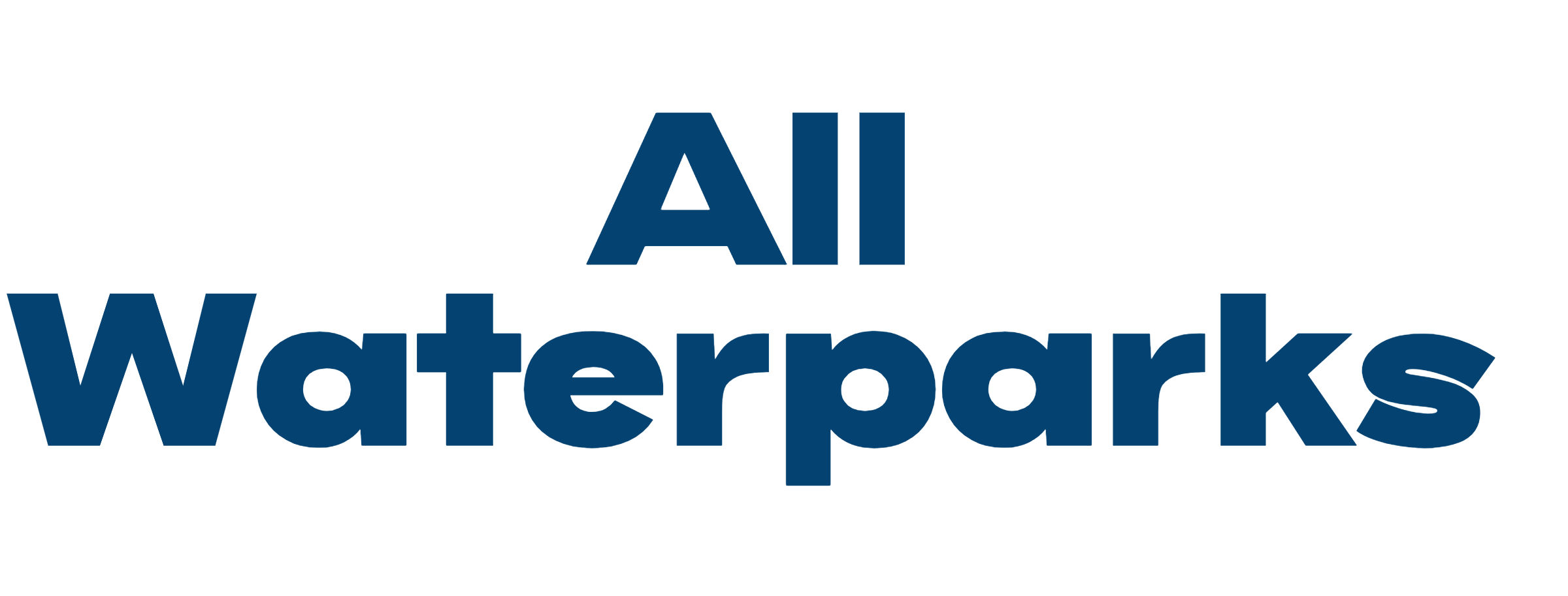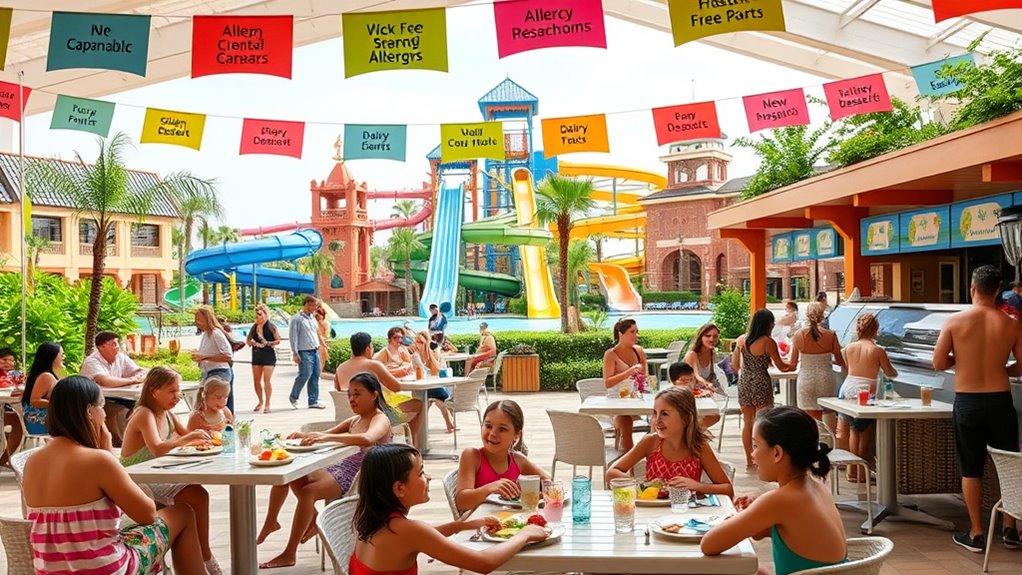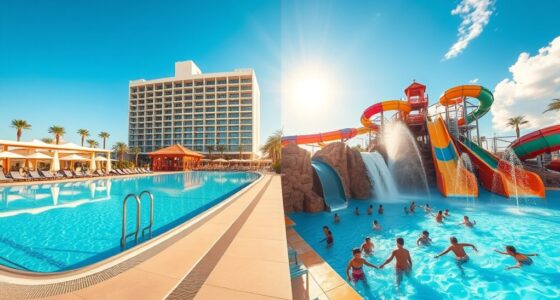At water park resorts, allergy-friendly dining is prioritized through staff training, clear communication, and designated allergen-aware areas. Menu options are carefully tailored with allergy labels, and tools like allergen cards help you communicate your needs. Resorts often offer specialized menus and strict protocols to prevent cross-contamination, but limitations remain. Staying informed and proactive guarantees safety—if you want to discover more about how these resorts keep you protected, keep exploring for detailed tips.
Key Takeaways
- Many water parks offer designated allergy-friendly dining areas and specialized menus to accommodate guests with food allergies.
- Staff training includes allergen identification, cross-contamination prevention, and emergency response to ensure guest safety.
- Clear menu labeling, allergen cards, and digital tools help guests communicate dietary restrictions effectively.
- Resorts often require advance notice for allergy accommodations and provide ingredient lists or allergen guides at food outlets.
- Complete allergen-free environments are rare; guests should verify food options and communicate directly with staff for safety.
Staff Training and Guest Communication Strategies

Effective staff training and communication are essential to ensuring guest safety in an allergy-friendly water park environment. You should implement extensive training programs that teach staff to identify allergens, understand reaction severity, handle emergencies, and prevent cross-contamination. Incorporate interactive modules, such as real-life scenarios and quizzes, to boost engagement and retention. Involving medical experts can add credibility and valuable insights. Make training mandatory for all staff to ensure consistency. Clear communication strategies are equally important. Staff must label menus accurately, encourage guests to notify them about allergies, and recognize allergy symptoms. Establish emergency protocols and maintain confidentiality to protect guests’ privacy. Well-trained staff and effective communication create a safe, informed environment where guests feel comfortable disclosing allergies and trusting staff to handle their needs. Ongoing education ensures staff stay current with the latest allergy information and best practices. Additionally, emphasizing currency exchange awareness among staff can help prevent misunderstandings related to international guests’ needs, especially in diverse water park locations.
Designated Allergy-Friendly Dining Locations

Many water parks now designate specific dining locations to better accommodate guests with food allergies, making it easier for you to find safe and reliable options. For example, Disney World’s Blizzard Beach features LottaWatta Lodge, while Typhoon Lagoon offers Leaning Palms as allergy-friendly spots. Cedar Point emphasizes consulting with chefs for allergy guidance at various eateries. Great Wolf Lodge is known for accommodating dietary restrictions through specialized menus. Universal Orlando advises notifying security about allergies upon entry, though specific locations aren’t detailed. Additionally, understanding current news in Indonesia can help you stay informed about health advisories and safety protocols at these venues.
Policies and Protocols for Managing Allergens

Water park resorts implement strict allergen management procedures to keep guests safe, including clear protocols for food preparation and cross-contact prevention. Staff training standards guarantee employees understand allergy risks and know how to respond quickly in emergencies. Effective guest communication strategies, like allergen menus and direct conversations with supervisors, help you navigate safe dining options during your visit. Promoting self-awareness among staff ensures they recognize and respect individual guest needs related to allergies, further enhancing safety and trust.
Allergen Management Procedures
To guarantee guest safety, water park resorts implement thorough allergen management policies that prioritize clear communication, strict protocols, and staff training. These procedures include:
- Advance Notification: Guests are encouraged to contact the resort beforehand to discuss meal options and ensure safety.
- Allergen Menus: Detailed allergen menus help you identify safe food choices easily.
- Cross-Contamination Control: Protocols like separate preparation areas minimize the risk of cross-contact.
- Guest Communication: You’re advised to inform staff about your allergies to ensure proper meal handling.
- Staff Training: Resorts conduct regular staff training on allergy awareness and emergency procedures to enhance guest safety. Staff training ensures employees are knowledgeable about allergen protocols and can respond appropriately in case of an emergency.
- Quality Control Measures: Implementing food safety standards helps maintain high-quality, allergen-free meals and reduces the risk of accidental exposure.
Resorts also provide online resources, signage, and dedicated guest services to support allergen management. Regular staff training and strict safety procedures help maintain high standards, ensuring a safe dining environment for allergy-sensitive guests.
Staff Training Standards
Effective staff training is essential for maintaining a safe and consistent approach to allergen management at water park resorts. Your training program should be thorough, covering allergen identification, reaction severity, and proper handling. Make certain all staff, from kitchen to front desk, participate in mandatory, interactive modules that include real-life scenarios and quizzes to boost retention. Involving medical professionals adds credibility and expertise. Regular refresher courses are crucial to stay updated on best practices and emerging trends. Incorporate allergen management into existing HACCP plans, and make certain staff are aware of Natasha’s Law and the 14 common allergens. Appoint an allergen champion, review processes regularly, and utilize software like Nutritics to minimize human error. Implementing allergen management as a core function and professional training through recognized programs like AllerTrain® and ANAB accreditation affirm your staff’s preparedness. Additionally, emphasizing comprehensive allergen awareness training ensures that staff can confidently identify and handle allergenic ingredients, reducing the risk of cross-contact or contamination.
Guest Communication Strategies
Clear and consistent communication is essential for ensuring guest safety and confidence when managing food allergies at water park resorts. You should implement policies that keep guests well-informed and supported. Consider these strategies:
- Use clear signage to highlight allergy-friendly options and allergen warnings throughout dining areas.
- Ensure menu labeling clearly identifies common allergens like nuts, gluten, or shellfish.
- Leverage digital communication platforms to update guests about allergy protocols and options.
- Provide pre-visit information via websites or emails so guests can plan ahead.
- Regularly train staff on allergy awareness and response procedures to ensure consistent and knowledgeable guest service. Staff training programs are vital for maintaining high safety standards and building guest trust.
- Incorporate emergency protocols that are clearly communicated to staff and guests to effectively handle allergic reactions if they occur.
These measures help guests feel safe and empowered. Additionally, offering on-site support and clear emergency procedures fosters trust. Effective communication reduces risks and enhances the overall guest experience.
Menu Options and Food Variety for Sensitive Guests
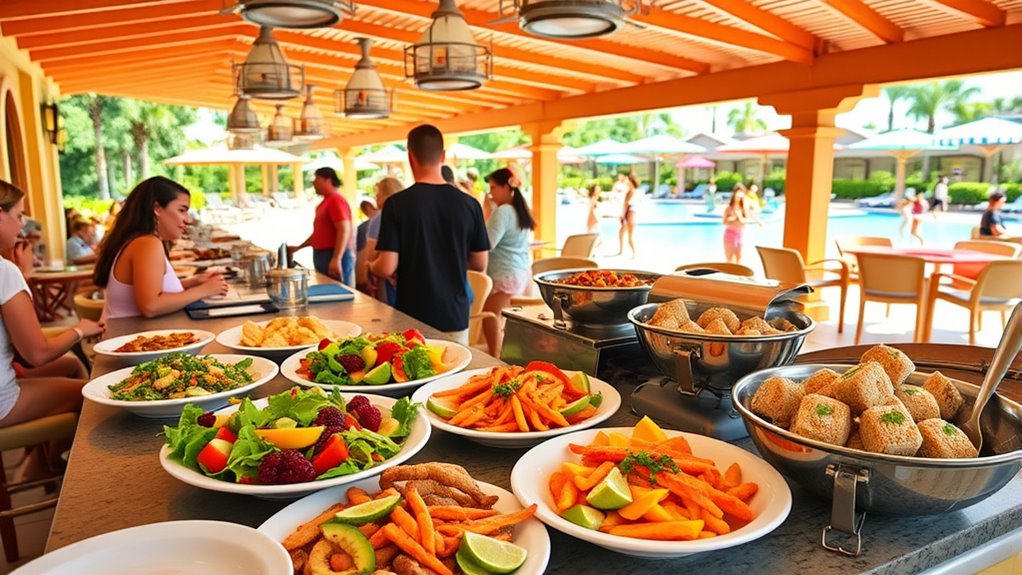
You’ll find a variety of allergy-friendly menu options designed to meet different needs, from safe soft-serve ice cream to dedicated allergen menus. Many resorts offer customizable meals, allowing you to work with staff to create dishes that suit your allergies. With these choices, you can enjoy a wider range of foods without sacrificing safety or taste. Additionally, Disney’s allergy menus and management practices are frequently updated and accessible through their guides, helping you stay informed about the latest options and safety procedures. Implementing appropriate kitchen techniques and protocols further enhances food safety for sensitive guests.
Diverse Allergy-Friendly Choices
Water park resorts now offer a variety of allergy-friendly menu options tailored to sensitive guests, guaranteeing everyone can enjoy a meal safely. These resorts provide diverse choices designed to meet different dietary needs and reduce allergy risks. For example, Typhoon Lagoon’s Leaning Palms offers allergy accommodations, while Disney’s soft-serve ice cream is safe for nut and gluten allergies. At SeaWorld, Sharks Underwater Grill is dedicated to allergy-friendly dining, with staff trained to manage allergens. Universal Orlando features gluten-free and plant-based options, and Discovery Cove provides all-inclusive meals tailored to allergies. Some resorts, like Great Wolf Lodge, go further by implementing peanut-free policies and separate prep areas. Always inform staff about your allergies to ensure safe food preparation and enjoy your visit worry-free. Additionally, many resorts are adopting allergy-aware practices to better serve guests with diverse sensitivities.
Customizable Meal Options
Many water park resorts recognize the importance of offering flexible dining options to accommodate guests with allergies and dietary restrictions. They provide multiple venues like quick-service counters, full-service restaurants, and snack bars, giving you a range of choices. Customizable meals, such as build-your-own sandwiches, salads, and pizzas, let you exclude allergens or unwanted ingredients. Menus often include allergy-friendly labels or recommendations for gluten-free, dairy-free, or nut-free options, making it easier to select safe meals. Some resorts encourage advance notice or app-based customization, ensuring your meals meet your needs. Additionally, flexible meal plans and snack credits let you enjoy a variety of dining experiences at different times throughout your stay, offering convenience and peace of mind for sensitive guests. Resorts often train their staff to better assist guests with special dietary needs, enhancing safety and confidence during dining. Understanding the importance of special dietary needs can help resorts improve their service and ensure guest satisfaction.
Tools and Resources for Allergy Information
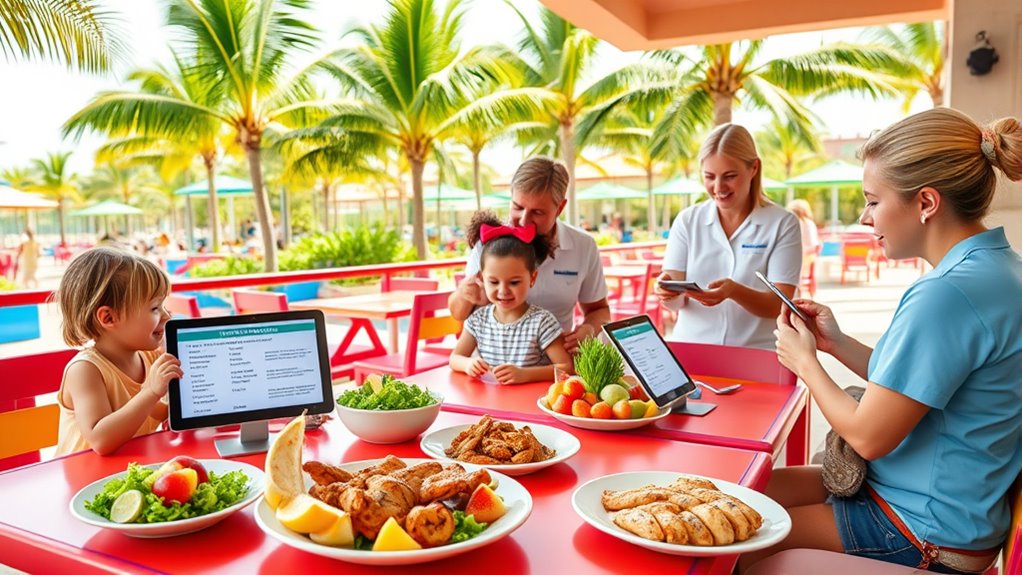
Finding your way through allergy information at water park resorts is made easier with a variety of specialized tools and resources. These help you identify safe dining options and communicate your needs effectively. For example, allergen cards provide quick access to allergen details, while chef cards let you clearly explain your dietary restrictions to food staff. Reviewing menus online before your visit helps you plan ahead and ask informed questions. Additionally, speaking with a supervisor ensures your meal is safely prepared. Parks also offer digital resources like mobile apps and detailed allergen guides, making it simple to access information anytime. Having access to allergen guides and digital tools can significantly enhance your safety and confidence during your visit. Utilizing educational and safety-focused resources can further improve your dining experience and peace of mind.
Limitations and Disclaimers in Allergy Accommodations
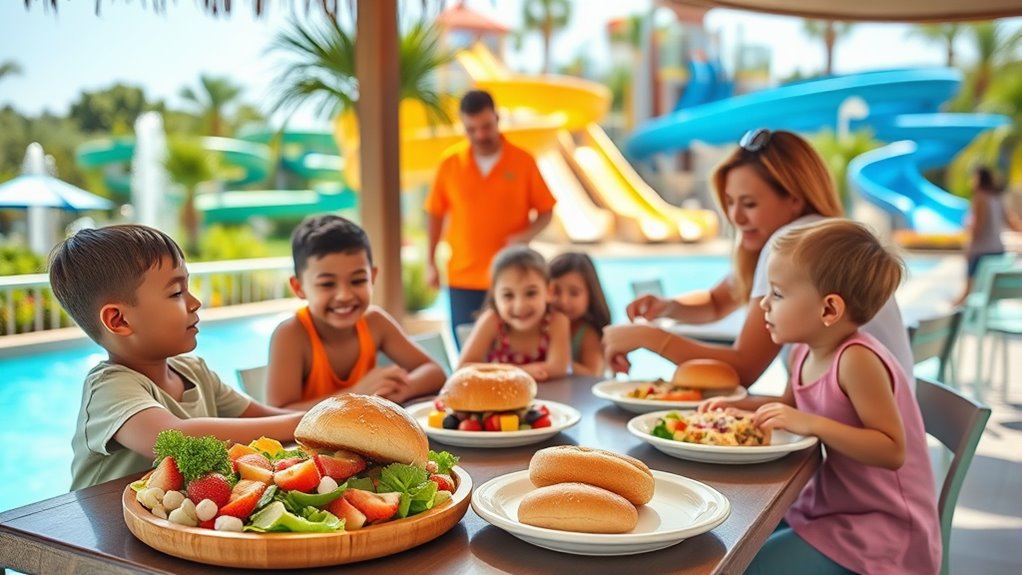
While allergy-friendly tools and resources can help you identify safer dining options, it’s important to recognize the inherent limitations and disclaimers that come with allergy accommodations at water park resorts. Complete allergen-free environments are rarely guaranteed due to shared kitchen spaces and cross-contamination risks. Many resorts openly acknowledge that despite dedicated prep zones, ingredients may be processed with allergens elsewhere. Staff training reduces but doesn’t eliminate the risk of accidental exposure. Additionally, allergy-friendly menu options are often limited, and menus may exclude certain allergens or require verification with staff. Resorts typically include disclaimers stating they cannot guarantee allergen absence and may refuse service if safety concerns arise. Relying on your proactive communication and understanding these disclaimers helps ensure a safer experience. Understanding these limitations is crucial for managing expectations and maintaining safety while enjoying dining at water park resorts. Being aware of allergen cross-contact risks can help you make more informed decisions and advocate effectively for your safety.
Best Practices for Guests With Severe Allergies
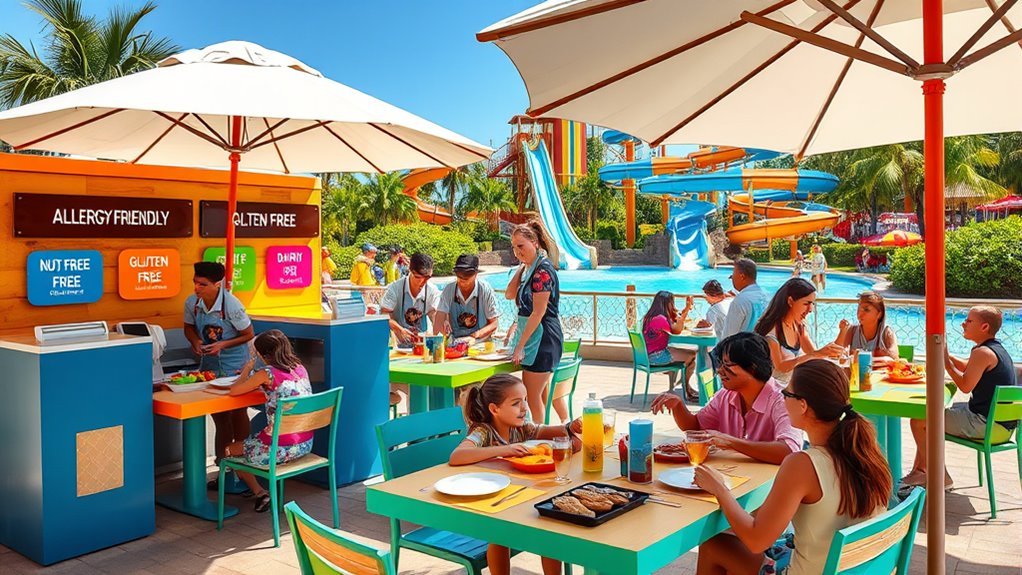
Preparing in advance is vital when visiting a water park resort with severe allergies. You should thoroughly review the resort’s allergy policies and contact guest services to confirm accommodations. Notify the resort about your specific allergies beforehand to guarantee personalized meal preparations. Carry documented allergy information, including medical action plans and epinephrine auto-injectors, for emergencies. It’s also imperative to understand the resort’s policy on outside food, especially if your allergies are severe or multiple. Use allergy cards or ingredient lists provided by the resort to communicate restrictions clearly to food staff. Understanding that some reactions may be caused by irritant dermatitis rather than true allergy, it’s important to differentiate between symptoms caused by chlorine sensitivity and actual allergies to ensure proper treatment. To stay safe: – Consult with onsite staff for ingredient info before ordering. – Avoid unlabeled or complex menu items. – Choose allergy-safe or allergen-free venues. – Carry personal utensils and sanitizers to prevent cross-contact. Additionally, being aware of regional allergy prevalence can help you better prepare for potential reactions during your visit.
Role of Technology in Enhancing Allergy Safety

Technology plays a crucial role in enhancing allergy safety at water park resorts by providing tools that improve communication, accuracy, and response times. Digital menu systems clearly label allergens and ingredients, making it easier for you to identify safe options quickly. Mobile apps enable guests to report allergies and receive personalized dining recommendations, reducing risk. Automated ingredient tracking software minimizes errors in food preparation, ensuring allergen information is accurate. Real-time alert systems notify staff immediately about guest allergies, allowing faster responses. Data analytics help identify common allergens and refine menu choices for safety. Additionally, kitchen management software and barcode scanning improve ingredient tracking. Furthermore, regular staff training on allergy awareness and emergency procedures ensures a prepared response to any allergic reactions. These technologies work together to create a safer, more efficient dining experience for guests with allergies.
Collaboration With Suppliers and Ingredient Transparency

Water park resorts rely heavily on their suppliers to provide safe, allergen-free ingredients, making collaboration and transparency essential. You should know that many parks partner with organizations like FARE to train staff and standardize allergy protocols. These partnerships ensure ongoing education, keeping staff updated on best practices and safety standards. However, sourcing from multiple third-party manufacturers complicates allergen control, as ingredient formulations can change without notice. You’ll find allergen info at many food locations, and some parks, like Kings Island, offer ingredient lists upon request. Despite these efforts, ingredient transparency can be limited by supplier updates, and no park guarantees 100% allergen-free food. Ingredient formulations can change unexpectedly, always communicate your needs directly with staff and carry necessary emergency supplies to stay safe, especially considering that supplier ingredient updates can impact allergen control measures.
Frequently Asked Questions
How Do Resorts Handle Unexpected Allergen Exposure Incidents?
If you experience unexpected allergen exposure, the resort’s staff quickly responds by administering epinephrine if needed and providing immediate first aid. They are trained to handle emergencies and coordinate with nearby medical facilities for further treatment. You should inform staff right away, follow their instructions, and stay calm. Resorts have established protocols to guarantee your safety, including locating first aid stations and contacting emergency services promptly.
Are There Dedicated Staff Members Solely Responsible for Allergy Management?
Yes, some resorts have dedicated staff members whose sole focus is allergy management, acting like vigilant sentinels guarding your safety. These specialists, often restaurant managers or allergy coordinators, meet with you upon arrival and oversee your dining experience. They coordinate with kitchen staff, ensure communication flows smoothly, and handle any concerns, so you can relax and enjoy your trip, knowing your allergies are in expert hands.
Can Guests Request Custom Allergy-Friendly Meals Not on the Menu?
You can’t typically request custom allergy-friendly meals that aren’t on the menu. Most water parks and resorts offer allergen menus or special accommodations if you notify them in advance. However, completely custom, off-menu meals are rarely available due to safety concerns and kitchen limitations. It’s best to contact guest services beforehand, bring safe snacks if needed, and carry emergency medication to guarantee your safety during your visit.
What Procedures Are in Place for Allergy Concerns During Special Events or Festivals?
When it comes to allergy concerns during special events or festivals, you should be proactive. Notify organizers beforehand so they can prepare accommodations. Look for clearly labeled food stations and ask vendors about ingredients. Some events have dedicated staff trained to handle allergies, and many offer allergy-friendly options like gluten-free or nut-free dishes. Remember, it’s better to be safe than sorry, so communicate your needs clearly and early.
How Often Are Allergen Safety Protocols Reviewed and Updated?
You should review and update allergen safety protocols based on your operational needs and risk assessments, as there’s no fixed schedule mandated by regulators. Industry best practices suggest conducting periodic validation studies and re-evaluating procedures when changes occur, such as new equipment or products. Regular monitoring and verification help guarantee protocols remain effective, so consider establishing a routine review process that aligns with your specific risks and operational updates.
Conclusion
By embracing these allergy-friendly strategies, you create a safe haven where guests with sensitivities feel like they’re steering a well-charted map, not lost in a maze of uncertainty. Your commitment transforms the water park resort into a welcoming oasis, where everyone can plunge into fun without fear. With every step you take—training staff, designing menus, and leveraging technology—you turn the tide toward inclusivity, ensuring memorable experiences for all visitors.
